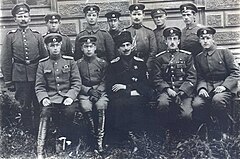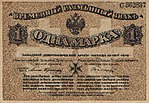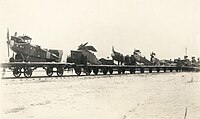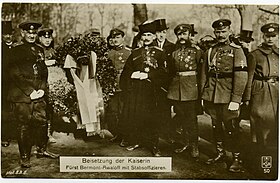Pavel Bermondt-Avalov
| Awards | Order of St. George Order of Saint Anna |
|---|---|
| Other work | Russian National Liberation Socialist Movement Russian National Socialist Movement |
Born into a Georgian-Russian family, Avalov received a musical education in
After being demobilized in 1917, Avalov became involved in the
Early life
Origins
Pavel Bermondt-Avalov was born in
Military service

After receiving a musical education with Professor Ziminski of the
In 1905 Avalov converted to
First World War
During the
Civil War
Russian Civil War
After the
Formation of the Bermontians

After the end of the First World War the

Avalov arrived in
After the disbandment of general Rüdiger von der Goltz's German Baltic volunteer corps, the German troops were ordered to retreat from the Baltics and return home, however Goltz and the soldiers refused in hopes of gaining land and citizenship in Latvia as was promised to them by the Latvian government. Avalov was later appointed the "commander of all Russian units formed in Courland and Lithuania" by Yudenich. Avalov's army numbered some 50,000 men at this point - 40,000 of them being German or Balto-German and 10,000 being Russian. Since the German government stopped paying for the troops, finances were mostly coming from German economic leaders that had interests in the Baltics, as well as J. P. Morgan Jr. and the Order of St John. Avalov's army also printed its own money.[10] The army was marked by internal disagreements between Avalov and Vyrgolich.[11][12]
War in Latvia

The Bermontians occupied a large part of
War in Lithuania

The Bermontians began their attack on Lithuania in July. The Bermontians, having occupied a large part of
Later years

Interwar

From 1920 to 1922 Avalov worked at the Berlin film studio
In 1925 Avalov published his memoirs in German and Russian, entitled In the Fight Against Bolshevism.
Avalov was soon imprisoned in Berlin, and then transferred to a concentration camp outside the capital, on suspicion of embezzling the aforementioned 8,000 German mark subsidy given by the NSDAP to the Russian National Socialist Movement. In winter of 1935 he escaped from the concentration camp and fled to Switzerland, and then to Italy, settling in the city of Merano. Avalov married the princess of Mecklenburg-Schwerin, who was the cousin of Grand Duke Kiril Vladimirovich, who owned an estate in Yugoslavia. At the end of 1936 he settled in Belgrade.[5][6]
Last years and death
Avalov eventually emigrated to the United States and settled in New York. Avalov continued participating in Russian emigre organizations until his death on 27 December 1973, although his death date is sometimes given as 12 January 1974.[5]
Personality and appearance
Supposedly Avalov would usually talk to his soldiers and officers, trying to sway them.[18] Most contemporaries' accounts of Avalov are negative; “an arrogant, empty, crafty and weak person... an arrogant, petty man; to a certain extent, smart and cunning, like a snake, with a certain insolence and bravura behavior, but cowardly at heart." Stephen Tallent, a British delegate, also characterizes Avalov as "...Caucasian by birth, but of mixed blood, perhaps half Jewish. He is adventurous, obviously suffers from megalomania, is very theatrical, and seems to see himself in the future as a possible Tsar of Russia. [...] Lately he has been very openly befriending Germans in Jelgava, organizing extravagant parties and often drinking heavily. It is said that he knows very little German, but he does have a few phrases, the main of which is Deutschland über alles, which he uses in front of Germans, especially when drinking."
Latvian writer Andrievs Niedra describes Avalov as of "average height, thin, but proportionately built, with dark hair and eyes, a pale face of a southerner, a small mustache sticking up. He held himself straight, solidly, sometimes his body seemed to freeze in iconic immobility, especially when he felt that many eyes were turned on him. Outside the house, he wore a long Caucasian suit with gazyrs on his chest and a hat on his head. Bermont spoke in a baritone voice... in a cheerful mood, he also willingly danced Caucasian mountain dances.” Avalov has also have been reported to shooting one of his officers in the leg after drinking too much alcohol.[9]
Legacy
In Lithuania and Latvia, the word Bermontiada gained prominence as a term to describe their independence wars, as well as becoming a synonym for "adventure".[19] Lucjan Żeligowski and his actions during the Żeligowski Mutiny were often compared to Avalov's warlord behavior.[20][21] Avalov is featured in the Latvian film Defenders of Riga, played by Girts Krumins.[22]
Honours and awards
- Cross of St. George, 3rd and 4th degrees
- Order of St. Anna, 4th degree.
Bibliographical sources
- Bermondt-Avalov, Pavel (1925). Im Kampf gegen den Bolschewismus. Erinnerungen von General Fürst Awaloff, Oberbefehlshaber der Deutsch-Russischen Westarmee im Baltikum (in German). Glückstadt, Hamburg: Verlag J.J. Augustin. OCLC 15188750.
- Birontas, Adolfas (1934). Bermontininkams Lietuvą užpuolus. Šviesa.
- Čepėnas, Pranas (1986). Naujųjų laikų Lietuvos istorija. Dr Kazio Griniaus Fondas.
- Laurinaitis, Jonas Martynas (1990). Pirmasis nepriklausomos Lietuvos dešimtmetis 1918-1928. Šviesa.
- Paluszyński, Tomasz (1999). Walka o niepodległość Łotwy 1914-1921. Warsaw: Dom Wydawniczy Bellona.
- Paluszyński, Tomasz (2007). Walka o niepodległość Estonii 1914-1920. Poznań: Oficyna Wydawnicza Wyższej Szkoły Języków Obcych.
- Клавинг, Валерий (2003). Гражданская война в России: Белые армии. Военно-историческая библиотека (in Russian). Moscow.
{{cite book}}: CS1 maint: location missing publisher (link) - Šapoka, Adolfas (1989). Lietuvos istorija. Švietimo ministerijos knygų leidimo komisija.
References
- ^ a b c Tamašauskas, Kazimieras. "Pavel Bermondt". vle.lt.
- ^ "Bermondt ("Prince Awaloff") Paul Mikhailovich". bundesarchiv.de.
- ^ "Bermont - Avlov". cultinfo.ru. Archived from the original on 2007-09-30.
- ^ "Pavel Bermondt-Avalov". britannica.com.
- ^ a b c d e f g h i Gusachenko, Andrei. "Pavel Bermont". enciklopedija.lv.
- ^ a b c d e f g "Avalov-Bermond Pavel Mikhailovich". belrussia.ru.
- ^ "RUSSIAN WESTERN VOLUNTEER ARMY". whiterussia1.narod.ru.
- ^ a b c d "Bermondt-Avalov Pavel Rafalovich". hrono.ru.
- ^ a b Šiliņš, Janis. "What and why you need to know about Prince Bermont, who served the Germans". rus.lsm.lv.
- ^ "SOVEREIGN ORDER OF SAINT JOHN OF JERUSALEM". osjknights.com. Archived from the original on 2017-03-07.
- ^ Čepėnas, Pranas. Naujųjų laikų Lietuvos istorija (Volume II ed.). p. 538.
- ^ Birontas, Adolfas. Bermontininkams Lietuvą užpuolus. p. 67.
- ISBN 5-430-00866-4.
- ISBN 5-420-00631-6.
- ^ Baniusevičius, Aleksandras. Lietuvos kariuomenės kautynės su Bermontininkais prie Radviliškio.
- ^ Niessel, Henri Albert. Vokiečių išsikraustymas iš Baltijos kraštų. p. 79.
- ^ "Trimitas". 84 (13): 10. 1922.
- ^ "How a German general used Russian soldiers to try to get back at Latvia". eng.lsm.lv.
- ^ "Trimitas". 12: 16. 1920.
- ^ "Trimitas". 16: 2. 1920.
- ^ "Trimitas". 14: 261–262. 1933.
- ^ "Rigas sargi (2007)". imdb.com.
